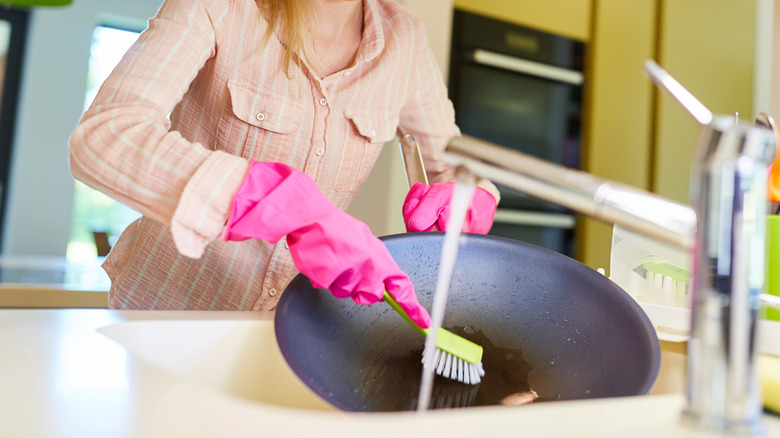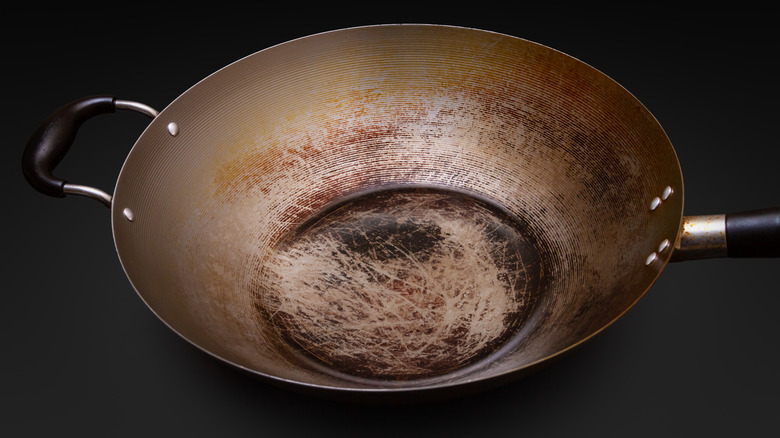The Surefire Way To Prevent Your Wok From Rusting After A Good Clean
After cleaning your carbon-steel wok, prevent rusting by ensuring that the wok is thoroughly dried. Begin by using a clean towel or paper towels to wipe away any excess moisture from the surface of the wok. Pay close attention to the interior and exterior surfaces, as well as the handles and any crevices where water might collect. Once you've removed as much moisture as possible, it's essential to heat the wok to eliminate any remaining traces of water. Place the cleaned wok on the stovetop over low to medium heat and allow it to heat up gradually. Heating the wok helps to evaporate any lingering moisture, ensuring that the surface is completely dry.
To be extra thorough, you can heat the wok until it becomes hot to the touch. This process not only removes moisture but also helps to sterilize the wok, killing any potential bacteria or microorganisms. Rotate the wok occasionally to ensure even heating and continue until you eliminate all moisture. Once the wok has been thoroughly dried and heated, allow it to cool completely before storing it. Avoid keeping the wok in a damp or humid environment, as this can foil your efforts to prevent rust. Instead, store the wok in a dry area with adequate ventilation to prevent moisture buildup — hanging it up is a great way to accomplish this. By following these steps, you can prevent rusting and prolong the life of your wok.
How to season a wok properly
Seasoning a carbon-steel wok is another essential step to prevent your cookware from rusting. To do so, place your clean and dry wok on the stovetop over medium heat. Heat the wok until it's hot and then add a small amount of oil with a high smoke point, such as canola or peanut oil. Tilt the pan to be sure the oil coats the entire inside of the pan or use a paper towel or brush to evenly coat the entire surface of the wok. Allow the oil to heat until it begins to smoke lightly. Be sure to protect yourself from burns by wearing an oven mitt or using a wok spatula.
Once the oil is smoking, carefully remove the wok from the heat and allow it to cool slightly. Then, discard any excess oil and wipe the wok with a clean paper towel to remove any residue. Once the pan has cooled, it is safe to store it until your next cook. Keep in mind that you should season your wok at least after every few uses, or whenever the surface begins to appear dull or food starts to stick. Proper seasoning creates a protective layer on the wok's surface, which helps to prevent rusting by sealing the metal and repelling moisture. Additionally, when you develop a non-stick surface on this cookware through seasoning, it makes cooking and cleaning easier while enhancing the flavor of the dishes you prepare in your wok.
How to remove rust from a wok
Even when you properly dry your wok and season it regularly, it can develop rust over time. Fortunately, there are easy ways to get rid of rust on your carbon-steel wok, making for a clean and healthy workspace. One common approach is to use a mixture of vinegar and salt. Sprinkle a generous amount of salt on the rusty areas of the wok. Then, pour white vinegar over the salt until it forms a paste-like consistency. Allow the mixture to sit on the rusted areas for several hours or overnight. Afterward, scrub the wok with a non-abrasive sponge or brush to remove the rust, repeating the process if necessary until the rust is completely gone.
Another method you can try involves using baking soda and a scrubbing pad. Create a paste by mixing baking soda with water until it forms a thick paste. Apply the paste to the rusted areas of the wok and let it sit for at least an hour. Then, use a scrubbing pad or steel wool to gently scrub the rust away. Rinse the wok thoroughly with water and dry it completely to prevent further rusting.
After removing the rust, it's essential to re-season your wok to prevent future rusting and maintain its non-stick properties. Follow the steps outlined for seasoning a wok properly, ensuring the entire surface is coated with oil and heated until it develops a dark, glossy patina. Then store it properly in a dry place.

